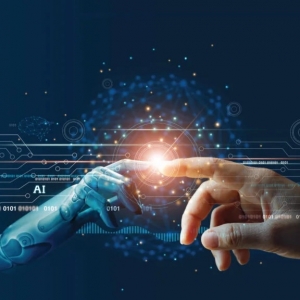In recent years, automation and artificial intelligence (AI) have witnessed a surge in popularity, and it’s anticipated to expand as organizations become more dependent on AI solutions to address issues. Numerous tech giants, like Amazon, Apple, and Alibaba, have already started to explore the possibilities of implementing AI and robotics in their organizations.
The introduction of robots into the workplace is set to alter how C-level decision-makers will do business, as they need to share space with robots as coworkers and learn new skills as robots will gradually take over tedious and dangerous tasks on behalf of their employees. There will be a shift in job responsibilities and obligations, creating bandwidth for strategic planning for better business development in sections where robotics are not utilized. Functional leaders in customer-facing roles may identify the best methods to serve clients and use automation to deliver personalized products and services on demand.
Robotics is becoming a game changer in various industries throughout the world.
From large-scale enterprises to small and medium-sized enterprises (SMEs), companies have started using robots to automate tasks and also deal with the shortage of workers.
For instance, collaborative robots (cobots) have rapidly become a valuable asset in the manufacturing and logistics industries. These cobots work with human work and help enhance quality control and productivity, leaving human employees to focus more on high-value tasks that require creativity, analytical, and problem-solving skills.
This article discusses the role of robotics in the modern business environment and how it will change the roles of C-level decision-makers. It serves as a thought-provoking read for C-level officers who must contemplate the transition by understanding how robots will impact their businesses, what adjustments are required in the organization, and how to achieve a happy coexistence of human and robot workers.
Robotics Changing the C-level Dynamics
C-level officers need to take a step back, carefully evaluate the usage of robots and AI in their organizations, and revise their position within it.
Here is how robot workers will redefine their roles in diverse companies across different industries:
Chief Executive Officers (CEOs)
CEOs are the figureheads of the company, as their vision and leadership will help drive change and guide the organization through a successful digital transformation. With the hiring of robot workers and the implementation of AI applications, they should ensure that the board of directors has the expertise to supervise proper governance and make quick decisions related to these technologies. CEOs will also need to be actively involved in creating a collaborative and harmonious work environment in which humans and robots work together with respect, dignity, and trust.
Robotics and artificial intelligence (AI) will change the workplace as some job roles will be replaced by robots and automation, but the technology will also lead to the creation of new jobs and highly valued responsibilities. This development will also affect the C-suite, as robots will minimize their responsibilities and help in creating robust strategies in this digital era.
To Know More, Read Full Article @ https://ai-techpark.com/robotics-is-changing-the-roles-of-c-suites/
Read Related Articles:
Diversity and Inclusivity in AI
Digital Twins Shaping Industries




